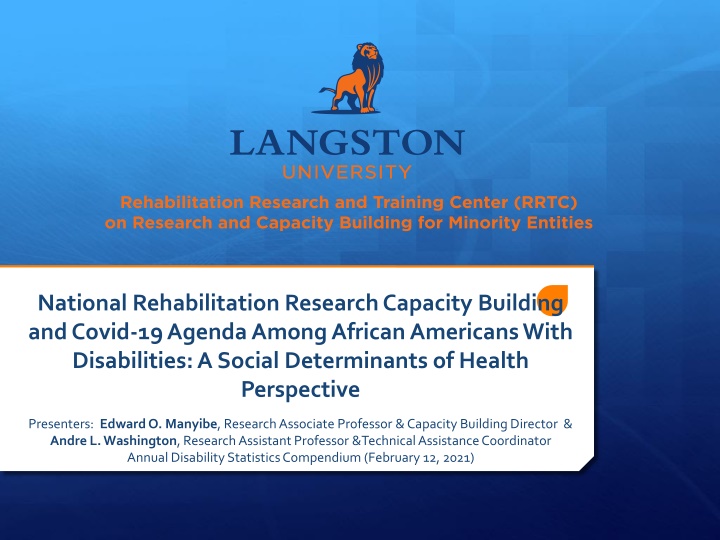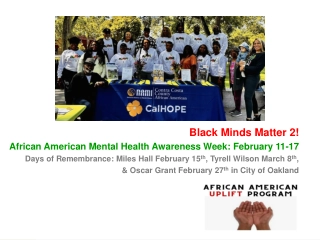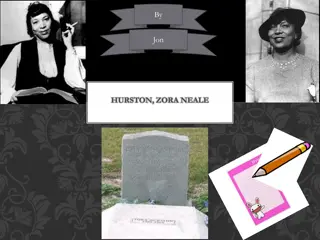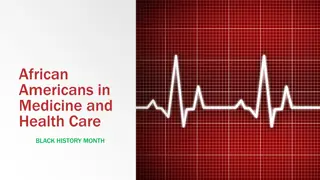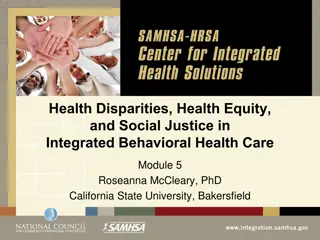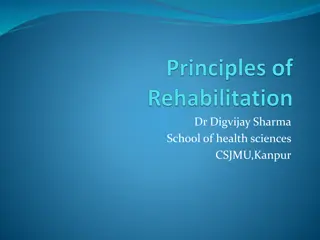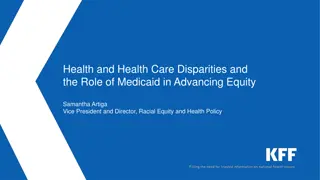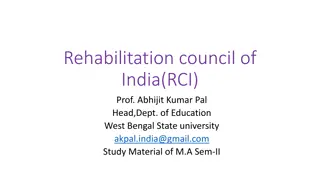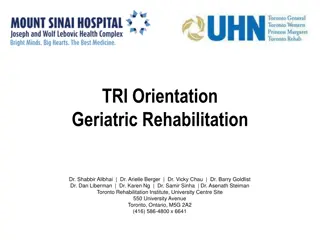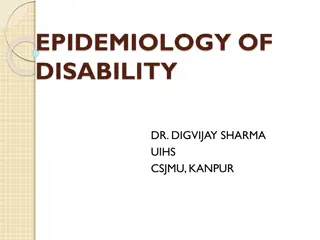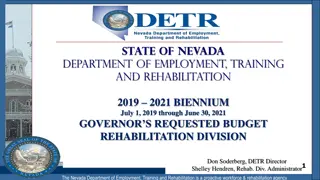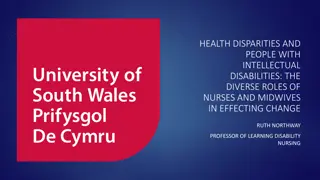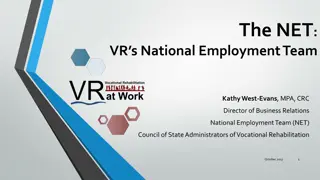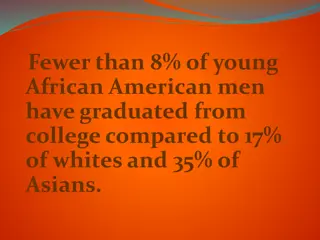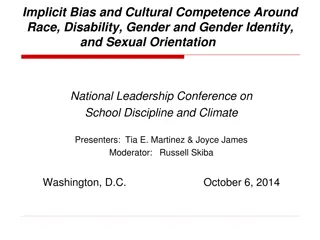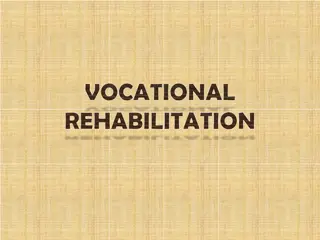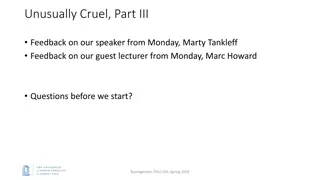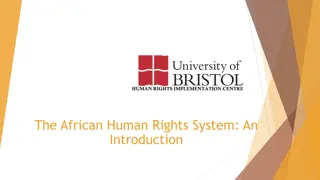Addressing Disparities in African American Disability Rehabilitation
Disparate rehabilitation and health outcomes among African Americans need innovative interventions to address underlying inequities. LU-RRTC is conducting research and projects to empower minority-serving institutions in improving disability research capacity and infrastructure.
Download Presentation

Please find below an Image/Link to download the presentation.
The content on the website is provided AS IS for your information and personal use only. It may not be sold, licensed, or shared on other websites without obtaining consent from the author.If you encounter any issues during the download, it is possible that the publisher has removed the file from their server.
You are allowed to download the files provided on this website for personal or commercial use, subject to the condition that they are used lawfully. All files are the property of their respective owners.
The content on the website is provided AS IS for your information and personal use only. It may not be sold, licensed, or shared on other websites without obtaining consent from the author.
E N D
Presentation Transcript
National Rehabilitation Research Capacity Building and Covid-19 Agenda Among African Americans With Disabilities:A Social Determinants of Health Perspective Presenters: Edward O. Manyibe,Research Associate Professor & Capacity Building Director & Andre L. Washington, Research Assistant Professor &Technical Assistance Coordinator Annual Disability Statistics Compendium(February 12, 2021)
LU-RRTC Mission To empower minority-serving institutions/ minority entities (e.g., historically Black colleges/universities [HBCUs], Hispanic- serving institutions [HSIs], Tribal Colleges/universities [TCUs], and Asian American and Native American Pacific Islander-serving Institution (ANNAPISIs]) to improve their disability and rehabilitation research capacity and infrastructure by conducting a programmatic line of research examining experiences and outcomes of persons with disabilities from traditionally underserved racial and ethnic populations and communities and capacity-building efforts. Annual Conference on Disability Statistics: Meeting Emerging Demands for Data February 12 , 2021 Zoom Webcast
The Problem Disparate rehabilitation and health outcomes and experiences among African Americans are well documented. Recent forecast research indicates that such disparity trends are likely to endure in the absence of innovative policy and practice interventions (e.g., Moore, Wang, Eugene- Cross, & Washington, 2016). While African Americans/Blacks make up 13 percent of the U.S. population, they account for only 4.8% of professionals employed in the science and engineering disciplines. Annual Conference on Disability Statistics: Meeting Emerging Demands for Data February 12, 2021 Zoom Webcast
Drivers of Existing Inequities An important driver of these national disparities is the under- participation of HBCUs and other minority serving institutions and their researchers of color, including those with disabilities in in federally-sponsored disability/health and rehabilitation R&D (Manyibe, Moore, Aref, et al., 2017; Moore et al., 2015). Our seminal study (Moore et al., 2012), funded through a Delta Sigma Theta Sorority, Inc. Distinguished Professor Endowed Chair (DPEC) award, documented this participation inequity (Moore et al. 2012). Annual Conference on Disability Statistics: Meeting Emerging Demands for Data February 12, 2021 Zoom Webcast
What LU-RRTC Is Doing to Address the Problem RRTC Research Agenda & Projects Collaborative Engagement Peer-to-Peer Mentorship Research Team Model (PMRTM) Evaluation LU-RRTC, ICI, SCSU, KF, and Five MSIs in IRCBIM Peer Multiple Mentor Model (PMMM) Evaluation LU-RRTC, ICI, SCSU, KF, A National Investigation of Opioid Use Disorder Impacts on Employment Prospects for PWDs from Diverse Backgrounds LU-RRTC A State Vocational Rehabilitation Agency and Veterans Affairs Emerging Co- Service Partnership Model Demonstration LU-RRTC and ODRS An Examination of Federally-Funded MSI-Based Research Centers Challenges and Opportunities in Advancing the Disability/Rehabilitation or Health Science A National Delphi Survey of Barriers to the Participation of HBCUs and Small African American-Owned Technology Firms in the Federal Assistive Technology Research and Development (AT-R&D) Enterprise LU-RRTC and LU-ARRT Post- Doctoral Fellows LU-RRTC and Select UCEDDs Early Intervention Disability, Rehabilitation, and Health Research Career Pathway Model (EIRCPM) Pilot Study LU-RRTC and KF Minority Entity IRCBIM Longitudinal, Mixed Methods Evaluation LU-RRTC, LU-ARRT Post- Doctoral Fellow COVID-19 Agenda LU-RRTC Annual Conference on Disability Statistics: Meeting Emerging Demands for Data February 12, 2021 Zoom Webcast
Peer-to-Peer Mentorship Research Team Model (PMRTM- Research Program 1A) Goal: The goal of this promising and emerging framework is to test the model s potential for building faculty members scientific research skills (e.g., research design, data collection techniques, and theoretical frameworks, selection of research questions, publication practices, & proposal development). Annual Conference on Disability Statistics: Meeting Emerging Demands for Data February 12, 2021 Zoom Webcast
Peer Multiple Mentor Model (PMMM) Evaluation Goal: To test the model s potential for building post-doctoral Research Fellows scientific research skills (i.e., explicit and implicit research skills) and research self-efficacy (confidence). Annual Conference on Disability Statistics: Meeting Emerging Demands for Data February 12, 2021 Zoom Webcast
A National Investigation of the Opioid Use Disorder Impacts on Employment Prospects for People with Disabilities from Racially/Ethnically Diverse Backgrounds Goal: To generate new knowledge about opioid use disorder among individuals with disabilities from racial and ethnic minority backgrounds (e.g., African Americans) that can be used as a foundation for developing interventions to improve employment outcomes for the target population. Annual Conference on Disability Statistics: Meeting Emerging Demands for Data February 12, 2021 Zoom Webcast
A State Vocational Rehabilitation Agency (SVRA) and Veterans Affairs (VA) Emerging Co-Service Partnership Model Demonstration Goal: To address the innovation gap by field- testing the SVRA-VA/VR&E Co-Service Partnership Model potential in a real world environment. (Oklahoma State Department of Rehabilitation and Oklahoma VA VR&E co- service practices will be monitored).
A National Delphi Survey of Barriers to the Participation of HBCUs and Small African American-Owned Technology Firms in the Federal Assistive Technology Research and Development (AT-R&D) Enterprise Goal: Generate empirical information about Barriers to the Participation of HBCU s and small African American Owned Technology Firms in the Federal Assistive Technology Research and Development (AT R&D) Enterprise. Generated information could be used to develop policy and practice interventions to increase these institutions footprint in AT&RD ecosystem. Annual Conference on Disability Statistics: Meeting Emerging Demands for Data February 12, 2021 Zoom Webcast
An Examination of Federally-Funded MSI-Based Research Centers Challenges and Opportunities in Advancing the Disability/Rehabilitation or Health Science Goal: To identify factors that begin to fill the knowledge gap about challenges faced by federally-funded MSI-housed research centers in advancing the science in the fields of disability/rehabilitation and health. Annual Conference on Disability Statistics: Meeting Emerging Demands for Data February 12, 2021 Zoom Webcast
Early Intervention Disability, Rehabilitation, and Health Research Career Pathway Model (EIRCPM) Pilot Study Goal: Identify factors that contributed to the EIRCPAM Fellows' interest in and willingness to be mentored within the area of minority disability research and to identify specific intervention strategies of the research project that were considered to be most significant in their development during the course of the study. Annual Conference on Disability Statistics: Meeting Emerging Demands for Data February 12, 2021 Zoom Webcast
Minority Entity Institutional Research Capacity-Building and Infrastructure Model (IRCBIM) Longitudinal, Mixed Methods Evaluation Goal: To longitudinally evaluate the long-term benefits of the Institutional Research Capacity- Building and Infrastructure Model (IRCBIM), an emerging RCB approach designed to build research skills and self-efficacy and enhance institutional research capacity and Research infrastructure (RI) systems at minority-serving institutions. Annual Conference on Disability Statistics: Meeting Emerging Demands for Data February 12, 2021 Zoom Webcast
COVID-19 Research Agenda: A Focus on African Americans With Disabilities On May 27, 2020, LU-RRTC facilitated a national listening session. The purpose was to frame the context for a national COVID-19 applied disability/health and rehabilitation R&D) agenda targeting African Americans and other people of color with disabilities. What we heard helped us to develop a Policy Brief Titled, Forecasting COVID-19 Issues for People of Color with Disabilities While Advancing the Minority-Serving Institution Research Capacity Building Science: A Framework for Federal Agencies. Annual Conference on Disability Statistics: Meeting Emerging Demands for Data February 12, 2021 Zoom Webcast
COVID-19 Research Agenda : Potential Collaboration with FEMA Collaboration meeting with FEMA Region 6 officials February 11, 2021 David Leiva, Academia Advisor, Region 6 Karen Stafford, National Disaster Recovery Support Cadre Dissemination of LU-RTTC Research finding regarding COVID- 19 Dissemination of FEMA COVID-19 service information activities for persons with disabilities Possible research collaboration on COVID-19/Disaster Management
COVID-19 Agenda: Selected Recommendations for Addressing Inequities (Cont d) Funding Inequities: NIDILRR, NIH, and other federal research agencies should inventory all current streams of funding to determine if inequalities exist by institutional type (e.g., HBCUs) across R&D investments. Access to information: NIDILRR, NIH, and other federal research agencies should collaboratively fund an annual networking conference to provide HBCU faculty and researchers opportunities to learn about data availability and IRB approval processes in rehabilitation agencies and centers, hospitals, community health centers, etc. NIDILRR, NIH, and other federal agencies should develop new creative avenues to communicate opportunities (i.e., FOAs, requests for comments, grants forecasts) with HBCU faculty scholars and researchers. Annual Conference on Disability Statistics: Meeting Emerging Demands for Data February 12, 2021 Zoom Webcast
Technical Assistance and Consulting Services Minority-Entity Faculty Research Capacity Building Path Concentrated Peer-to-Peer Mentor Support -Monthly meetings i.e. teams and/or individually Manuscript development and peer review publication Grant-writing and Management consultation Data management and analysis software (e.g., SPSS, NVivo), etc. Faculty Time Management -Teaching commitment- balance -Student advisement balance -Service commitment balance -Administrative duties balance Minority-Entity Institutional Infrastructure Path Research Infrastructure Strategic Planning -Charting a vision for research infrastructure enhancement and productivity -Examining culture and values for research and scholarship at ME -Identifying objectives to be used to guide ME toward achieving the vision - Research program development -Graduate program (e.g., doctoral program) development -Building research networks to increase SVRA capacity to serve underserved persons and communities Institutional Review Board (IRB) efficient operation and function Sponsored Programs operations and function Research assistants/administrative support operations Mini-grant Supplements - Research seed monies to jump-start ME Fellows research agenda -funding can be used for release time, library research resources, computer data management software (e.g., SPSS, NVivo), travel to present research, etc.
The Way Forward Strengthening research capacity at HBCUs is essential to maintaining and advancing a vital research enterprise in disability and health research as well eliminating long standing disability/health & rehabilitation disparities (Moore et al. 2012a; NIDILRR, 2011). HBCUs participation as federal research agency partners are key to efforts to diversify the scientific workforce as well as training the next generation of scientists. The U.S. Congress should amend the 1973 Rehabilitation Act (Section 21 Mandate enacted in 1992) to significantly increase NIDILRR s required annual budget designation of only 1% to minority-serving institutions to 15%. NIDILRR and other federal funding agencies, in collaboration with leaders at minority-serving institutions, should invest in technological resources that drive the R&D enterprise to help meet the 21st Century demands. Annual Conference on Disability Statistics: Meeting Emerging Demands for Data February 12, 2021 Zoom Webcast
Questions & Answers (Q&A)
Contact Information LU-RRTC On Research and Capacity Building for Minority Entities 6700 N. Martin Luther King Avenue Oklahoma City, Ok. 73111 Phone: (855) 497-5598 toll free Fax: (405)962-1638 RRTC email: capacitybuildingrrtc@langston.edu ARRT Website: www.langston.edu/capacitybuilding-rrtc Annual Conference on Disability Statistics: Meeting Emerging Demands for Data February 12, 2021 Zoom Webcast
FUNDING AGENCY ACKNOWLEDGEMENT The contents of this presentation were developed under a grant from the National Institute on Disability, Independent Living, and Rehabilitation Research (NIDILRR grant number 90RTST0001). NIDILRR is a Center within the Administration for Community Living (ACL), Department of Health and Human Services (HHS). The contents of this presentation do not necessarily represent the policy of NIDILRR, ACL, HHS, and you should not assume endorsement by the Federal Government.
